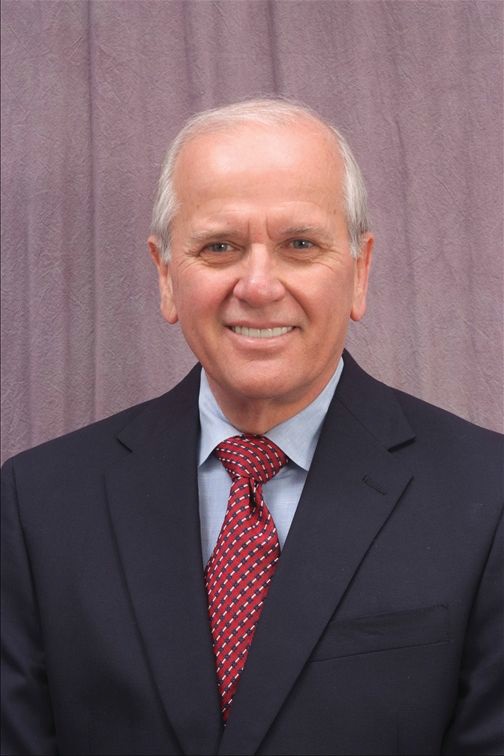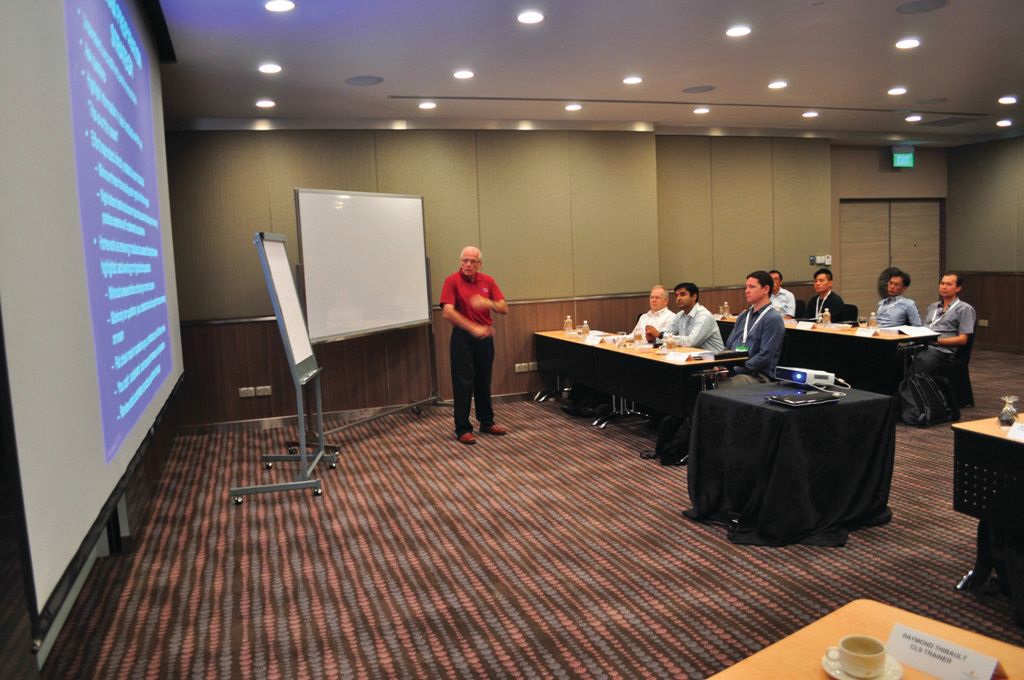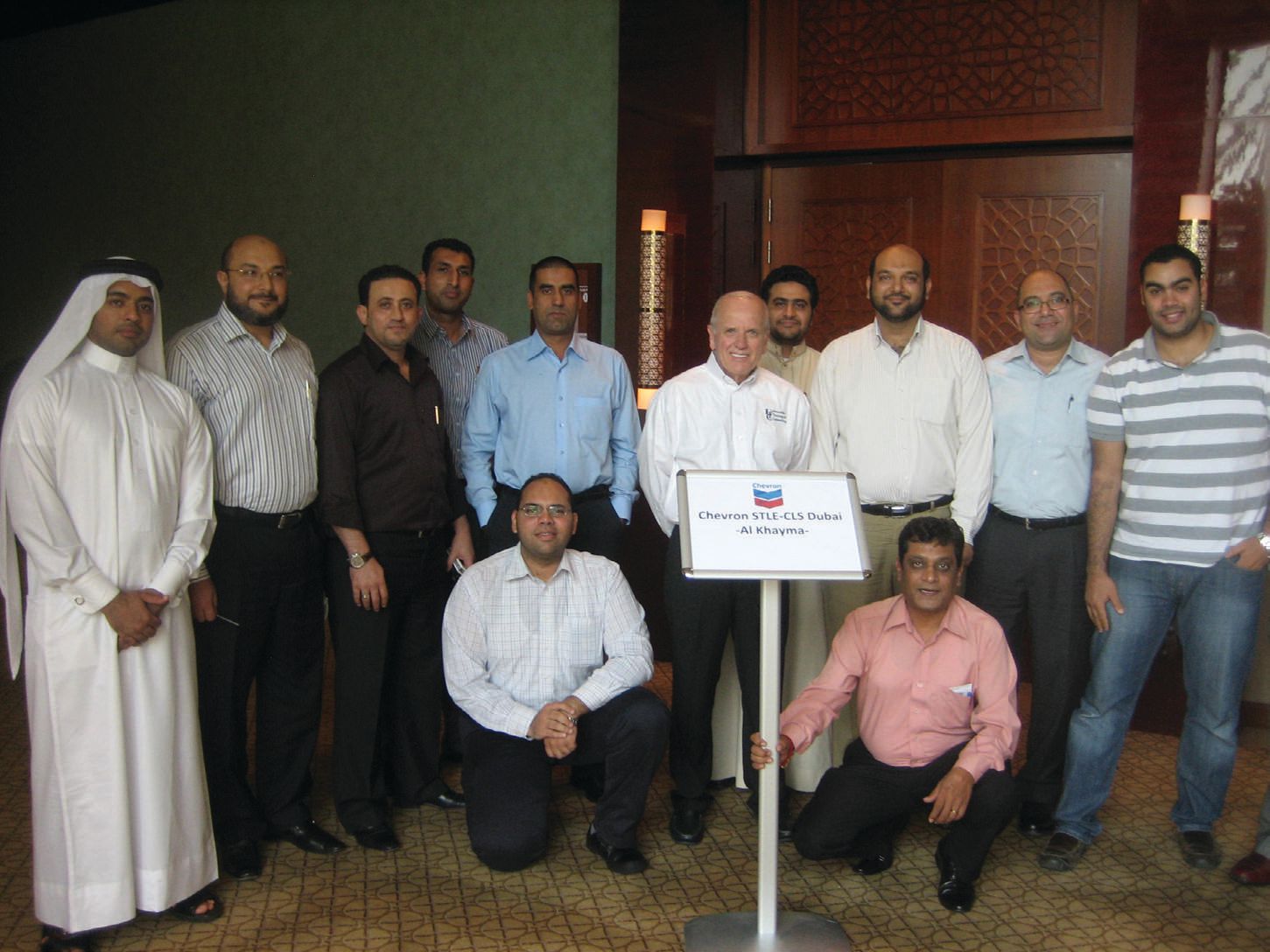20 Minutes With Raymond Thibault
Karl M. Phipps, Managing Editor | TLT President's Report May 2012
This former high-school chemistry teacher is now a world-renowned instructor providing lubrication-training opportunities for industry professionals and end-users.
EDUCATION
•
Master’s of Business Administration – University of Wisconsin, Madison, Wis.
•
Master’s of Science, Chemistry – University of Wisconsin, Madison, Wis.
•
Master’s of Arts, Teaching – Harvard University, Cambridge, Mass.
•
Bachelor’s of Science, Chemistry, University of New Hampshire, Durham, N.H.
WORK EXPERIENCE
•
Lubrication Training & Consulting (LTC), Cypress, Texas – 11 years (Present)
-
Owner providing international lubricant training and consulting.
•
Exxon Co./ExxonMobil Lubricants and Specialties – Six years
-
Territory Manager, Industrial Lubricants
• Exxon Chemical Co. – 25 years
-
Marketing Research/Strategic Planning
-
Senior Account Representative, Refinery Process Chemicals
-
Sales Manager, Refinery Process Chemicals
-
Sales Manager, Mining Chemicals
-
Sales Manager, Water Treating Chemicals
•
Manhasset high School, Manhassett, Long island, N.Y., Chemistry Teacher – Two years
CERTIFICATIONS
•
Certified Lubrication Specialist
•
Oil Monitoring Analyst – Levels I & II
•
Machinery Lubrication Technician – Levels I & II
•
Machinery Lubrication Analyst – Levels II & III
 Raymond Thibault
Raymond Thibault
TLT: How did you get started working as a training provider in the lubricants industry?
Thibault: As a young person, my goal was to become a high school teacher. I achieved this goal by teaching high school chemistry in Manhassett, Long Island, N.Y., for two years, which I enjoyed very much. I later decided to go to graduate school to pursue a career in the business world. After graduate school, I worked for Standard Oil of New Jersey, which later became Exxon. I spent my entire career working for Exxon and retired after 31 years of service. I was tasked with many job assignments, particularly technical sales. At Exxon I conducted technical and sales training classes and realized it was an area that I might want to pursue after I retired.
My last six years with ExxonMobil Lubricants & Specialties were spent working in industrial lubricants. This was the most challenging and rewarding of all of my previous assignments I had with the company. I enjoyed solving technical lubrication problems in industrial plants, and I also trained and mentored many of the new young chemical engineers who were hired for technical sales. I wish I had spent more of my career with ExxonMobil in the lubricants field.
After retiring, I knew that I wanted to continue working in the area of lubrication training, which I thoroughly enjoyed. I remember it was very difficult initially to establish a business base. Thus, I decided to pursue an area which I felt there was an unfilled need, which was preparing people for STLE’s Certified Lubrication Specialist™ (CLS) certification. I wanted this class to be an intense, comprehensive lubrication class, not just a certification class. My big breakthrough came when a major lubricant company decided to utilize me to conduct all of their CLS training for their employees, and the rest is history.
Since this time, I have conducted over 85 CLS classes worldwide. I have also developed other certification classes for those preparing for STLE’s Oil Monitoring Analyst (OMA) I & II certification, along with customized classes for end-users.
 For the past 11 years, Ray Thibault has owned and operated a lubricant training and consulting business, where he has taught classes, both in the U.S. and internationally, to end-users preparing for STLE’s CLS and OMA I & II certification.
TLT: What are the benefits of taking a training class or becoming certified?
For the past 11 years, Ray Thibault has owned and operated a lubricant training and consulting business, where he has taught classes, both in the U.S. and internationally, to end-users preparing for STLE’s CLS and OMA I & II certification.
TLT: What are the benefits of taking a training class or becoming certified?
Thibault: The lubricants business, particularly the industrial market, is not growing and is becoming more competitive than ever with the growing presence of specialty lubricants companies challenging the major lubricant companies in specialized segments of the industrial market. To compete in this market requires a technically competent sales force. In the last 10 years, we have seen a shift by major lubricant companies as to who has key interaction with end-users.
Many lubricant manufacturers have downsized their sales force in the field and have shifted the major responsibility of working with end-users to their distributors/marketers. There is a wide variability in technical competence amongst this group. Most of the major lubricant manufacturers have developed good internal training programs for their distributor/marketers. Some manufacturers employ highly experienced professionals who do marketer/end-user training, while others rely on their sales force and technical personnel, such as lubrication engineers, to do the training.
Furthermore, in promoting technical competence, manufacturers are now placing a greater emphasis on having their employees become certified. For example, I know of some lubricant companies who have required their marketers to have at least one CLS on their staff and also are giving cash bonuses to those who pass the exam. Because of this, I am seeing a growing number of marketers taking the CLS exam and becoming certified. In my opinion, obtaining the CLS certification has never been more important for this group. In addition, some marketer sales representatives have informed me that obtaining the CLS certification has even helped them gain greater credibility with end-users. For example, one individual told me he had been trying for a long time to meet with the key decision-maker in a large industrial plant with no success. Once he had his CLS, he was able to schedule an appointment and eventually obtained some of the plant’s lubricant business. Some of the major lubricant manufacturers require their sales and technical personnel to have the CLS designation in order to be promoted.
Previously, end-user training was done exclusively by lubricant manufacturers and their marketer/distributors, and it was primarily product focused. This started to change in the early 2000s with the emergence of outside training companies who, along with individual sales trainers, have entered this market and filled an important need in educating the end-user on the importance of lubrication and how to utilize best practices in their plants.
Through the International Council of Machinery Lubrication, a number of certifications have been developed geared to the end-user. The most popular is the Machinery Lubrication Certification (MLT)—presently there are nearly 4,000 MLT-certified individuals. A number of outside training companies provide training for this certification.
I have also noticed an increase in CLS certifications among end-users. These are the lubrication professionals in the plants who coordinate and oversee the lubrication program. As more end-users get certified, there is an increasing requirement for companies to deal primarily with technically competent lubricant sales representatives. As a result, training and certification has never been more important in the lubrication market today.
TLT: What are the biggest lubrication challenges end-users face?
Thibault: Competent manpower is a major issue facing all U.S. manufacturers. There is a shortage of people with mechanical skills, who have usually been through vocational programs, working in manufacturing plants. For many years, younger people found more attractive areas to pursue as a career, which has created a large gap. As older workers retire, a great deal of expertise is lost and not being replaced. As a result, a lack of skilled workers puts more demands on the present group. Unfortunately, lubrication may be at the bottom of the task list, and in too many cases it is neglected.
It’s tough convincing top management that lubrication is an integral part of good equipment reliability. Too many companies are short-term, bottom line focused and believe that most lubricants are basically the same, therefore they buy the lowest cost lubricant usually through a bid process. This has been magnified by the large number of frequent lubricant price increases which have occurred. Competition in manufacturing has never been higher—only the most productive will survive. Equipment is running longer, faster and hotter, which should increase the emphasis on the lubrication program instead of the de-emphasis.
Technical service issues are increasing, as some lubricant companies have had to make staff cuts. In some cases, I have had people tell me that they very rarely see a technical representative. This is especially true if the lubricant was purchased through a low-cost bid process.
TLT: What are some characteristics of a world-class lubrication program in a manufacturing facility?
Thibault: It is interesting that you asked that question because when I do training classes with end-users from different industries, I show them my Top 10 characteristics of a world-class lubrication program and ask them how many on this list they practice (see sidebar). It is encouraging to see an increase in companies starting to implement some of these practices. Also, there are a growing number of companies who have met all of these criteria.
RAY THIBAULT’S TOP 10 STANDARDS FOR A WORLD-CLASS LUBE PROGRAM
1.
Assign lubrication program to a technically competent person as coordinator and provide the necessary resources.
2.
Conduct lube survey on equipment and keep updated.
3.
Utilize electronic lube scheduling program such as a computerized maintenance management system (CMMS).
4.
Keep records of all lubrication activities.
5.
Work closely with OEMs and lubricant suppliers to ensure use of correct lubricant.
6.
Consolidate lubricants without compromising performance.
7.
Utilize competent people for lubrication and provide proper training.
8.
Set cleanliness goals on critical equipment.
9.
Establish an effective oil analysis program for proactive and predictive maintenance.
10.
Practice continuous improvement with lubrication program by being open to new technology and implementing the latest best practices.
TLT: What are the most common misconceptions you hear about lubrication?
Thibault: As I mentioned earlier, there are still many people who believe that all lubricants are the same or oil is oil, so put whatever is available in the equipment. They don’t understand the differences between different oil types and also some large quality differences between suppliers.
Fortunately, this attitude can be reversed with proper training. One of the questions I ask when I detect this attitude is does it matter what kind of oil you put in your automobile? I get a quick rebuttal of how important it is for them to use a particular brand of engine oil. My next question is why you would then put just any oil in that piece of equipment, which cost $2 million and can cause failure and potentially shut the plant down? This is especially true with grease.
Many people believe that the color of the grease is the most important property. The most popular color is red. Another big misconception regarding grease is the amount of oil contained in the grease. In my end-user classes when I ask that question, almost everyone believes it is 5%-10%. Many don’t realize the importance of the oil, and that is what lubricates the bearing.
Another common attitude with some people is that if they don’t see dirt or water in the oil, it is clean enough to put in their equipment. Most people don’t realize the most destructive particles are those you can’t see with the naked eye. I am encouraged by the growing realization that clean oil can dramatically increase equipment life. I am familiar with a large oil refinery that made major increases in Mean Time Between Bearing Failures by implementing a program emphasizing clean oil. This program was implemented almost 10 years ago with dramatic results. They once accepted frequent bearing failures as being normal and believed nothing could be done to improve equipment reliability.
One person decided to evaluate their lubricants for cleanliness and water and determined that dirty and wet oil was a major problem in equipment failures. He implemented a comprehensive lubrication program in the plant, beginning with stringent guidelines on new oil deliveries. They evaluated many suppliers and selected the one who met their stringent cleanliness and moisture requirements. All oil delivered for pumps, motors and compressors had a cleanliness requirement of 15/13/11and less than 50 ppm of water. The plant implemented a filtration program, along with a training program on the importance of oil cleanliness in their handling and dispensing of lubricants. The results were dramatic. Today, this plant has significantly reduced equipment failures, resulting in a cooperative effort between the end-user and lubricant supplier—a win-win situation for both parties.
 Ray Thibault shown with some of his students after teaching a training course in Dubai.
TLT: How valuable are professional organizations like STLE in offering education and training resources within the lubricants industry?
Ray Thibault shown with some of his students after teaching a training course in Dubai.
TLT: How valuable are professional organizations like STLE in offering education and training resources within the lubricants industry?
Thibault: I find that STLE is a great organization for lubrication professionals. In my type of business, networking is vital along with keeping abreast of new developments in tribology research and lubrication. The STLE annual meeting is a key event for me every year where I get to see and visit with many of my contacts and meet new ones. Also, it helps to expose me to the latest advances in lubrication.
STLE’s education courses presented at the annual meeting are excellent, as I have participated the last nine years as an instructor in the Basic Lubrication 101 course. This course is excellent for the beginner and even those with experience. I have seen many people who take the Basic Lube 101 course go for additional training—which is the goal. The other STLE courses offered at the annual meeting, which are more specialized and advanced, are very good, too. I highly recommend these to many people I come in contact with.
In addition, many local sections offer lubrication schools that provide a great service in training people. I have participated as an instructor the last 10 years in the Houston Lube School and the last five years in the Oklahoma Lube School and once at the Chicago Lube School. All of these schools provide a great learning experience for a nominal fee and help promote STLE.
The society’s online education programs also provide a great service for both the novice and the advanced lubrication person. They also are user-friendly and I think it is an area that should continue to be expanded.
I believe one of the biggest challenges for STLE, which they recognize, is getting more involvement from end-users. One of the problems is that many end-users don’t recognize the value of the society relating to their day-to-day lubrication activities. They want to see more information on practical lubrication applications in their plants. There have already been major improvements in this area as TLT has published more technical articles relevant to end-users. Also, the society’s education classes through the various lube schools, both nationally and locally, are continuing to increase their appeal to end-users.
TLT: What advice would you give someone on being a good training provider?
Thibault: First and foremost, you have to like being with people and enjoy seeing someone gaining knowledge that benefits them in their work. The greatest compliment a trainer can get from a former trainee is knowing the knowledge they gained in your class helped change their behavior, resulting in improvement in their work habits.
You need to continuously expand your knowledge base and be at the forefront of the latest developments in the field of lubrication so you can keep your classes fresh and relevant. You do this by reading technical books and journals relating to your field and attending industry conferences such as the STLE annual meeting. I find that I learn a great deal from people in my classes, especially from end-users who may be experts in a particular area.
Teaching lubrication requires equipment knowledge. I frequently make plant visits to some of my contacts to get more information on the practical side of lubrication.
Finally, you need to make learning about lubrication fun and practical, utilizing real-life experiences and also encouraging interaction amongst you and the trainees. Classes which are scripted and boring do not succeed.
TLT: What do you most enjoy about your job and how long will you continue working?
Thibault: I truly enjoy meeting new people and interacting with them in my classes. I also like the travel, which can be extensive. I have done international classes in such locations as Singapore (the last seven years), Malaysia, Egypt, South Africa and Dubai. I have enjoyed meeting people from other parts of the world and learning about their lubrication practices. I particularly enjoyed teaching the first CLS class held last month in Gurgaon (Haryana), India, which was co-sponsored by STLE and the Tribology Society of India.
One frequent question I get is how long will you continue working? I also get this question from my wife. The day that I awake and say, “I have to go to work,” is the day I will finally retire. This is not work for me but true enjoyment. I have a passion for training.
You can reach Ray Thibault at rlthibault@msn.com.